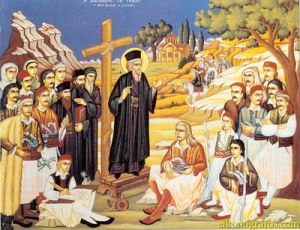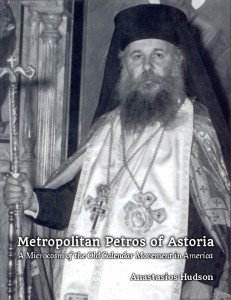Back in February, I wrote an article for the website of our Greenville, NC Orthodox Church about how I balance my calling to serve as an Orthodox priest in North Carolina with my secular job in computer networking. Readers of the blog and my other websites will recall that as a missions priest, I do not currently take a salary, and so I must work in order to support my family.
Recently, two different sites have picked up my article and republished it. It’s exciting for others to become aware of our work, and I pray that the article will help encourage others to follow God’s call to serve as Orthodox priests, especially in a missions context.
The original article on HolyTheotokosGreenville.org
The article on Pravmir.com
The article on GoodGuysWearBlack.org
Priests Have Feelings, Too
In a previous article, “Phone Calls That Never Lead to Visits,” I addressed the phenomenon of people contacting a priest to discuss visiting the parish, and then never showing up, and how this can be draining on priests. In that article, I discussed how I had taken an approach to limit the length of the initial conversation, until the inquirer paid a visit to the parish in person. The present article is a follow-up of sorts, and will focus on those who have gone beyond simply making a promise to visit, but have actually established a relationship with the priest, and then disappear.
We often think of our priests as the go-to guys when life gets tough, and in fact, that is certainly a function that we priests fill. Priests seem to have an unlimited supply of energy to deal with multiple problems simultaneously, and speaking to a priest about our struggles often alleviates them. Priests then tend to become involved with people when they reach a critical phase in their life. I might mention parenthetically that if we are actively engaging our faith and interacting with our priest when life is good, that we will have less chance of things developing into crisis mode in the first place, but human nature is what it is.
Another type of interaction that a priest has involves those looking into the Orthodox Christian faith. Contacting a priest is often a watershed moment, the moment when what we’ve been reading becomes suddenly tangible. Here is a person who embodies the faith we are feeling called to, and it is no longer an idea, but a reality. Such persons are quite naturally excited, and priests are often encouraged by their enthusiasm. It can be a blessing for both parties.
When people who are at a critical point in their life make contact with a priest and begin to open up to him about their situation, this creates a relationship. With a relationship in turn comes responsibility; the priest has agreed to take on the case of someone who needs his help, and through prayer, study, discussion, and possibly action, will attempt to take a person from point A to point B. The pastoral relationship involves trust, patience, and the building of rapport.
Sometimes, those of us who are dealing with a crisis find resolution to our problems, and no longer need the priest’s help. Sometimes, those of us looking into the Orthodox faith have second thoughts, or become overwhelmed, or find ourselves suddenly moving away from the area. This will perhaps end the interaction with the priest. Priests know this, and can adjust to the change, if they are prepared. The problem comes when they are left in the dark.
More often than some would imagine, people simply stop communicating with their priest when they no longer need him. The inquirer may be embarrassed that he has taken the priest’s time, and now no longer wishes to pursue Orthodoxy. The person with a problem may have taken a course of action that the priest recommended against, and feels the priest will be upset. It seems easier to simply let the contact lapse, as a confrontation would be unpleasant for both parties.
This attitude is simply wrong. Just as a priest takes on certain responsibilities in a pastoral relationship, so too does the one seeking the priest’s assistance. Keeping proper communication is a key responsibility of a lay person. A priest will try to follow up if he has not heard from someone, but in some cases, the follow-up emails or calls are not answered. Priests are not trained to “take the hint” and stop contacting others when contact ceases, but instead are prone to become more concerned.
Abruptly terminating contact with a priest after engaging him for help is inconsiderate, to say the least. Like it or not, priests have feelings, too, and they should not be forced into a situation of worry or even of wondering, “what happened?” Priests are adults, and can deal with changing circumstances. The best thing to do if we no longer need a priest’s help is to let him know honestly what has happened or changed. It may be an uncomfortable conversation, but it is the proper thing to do. It provides resolution for both parties, and in fact, it is helpful in the event that later on, we change our minds.
By this article, I do not seek to make anyone feel guilty, or to suggest that I am more concerned with the feelings of priests than the feelings of laypeople. Instead, I seek to exhort the readers to always act charitably and responsibility in their dealings with priests, and not to neglect courtesy in dealing with them. If a phone call is too emotionally difficult to make, an email or letter would be equally appreciated. In a culture that has so often forgotten common courtesy, it is necessary to point this out simply to educate and inform. May we ever strive to treat one another with courtesy and show concern for others.
When we hear the word “missionary,” we often think of one being sent to preach in a far-away land. Certainly, Christianity has a rich history of such people being sent away from the comforts of their homeland in order to work for the salvation of others. However, there is an equally great need, especially in today’s modern Western world, to conduct such efforts at home. There are a great number of people whom we might describe as “post-Christian,” who have been raised in a “Christianesque” culture. Such people have a familiarity with the Christian faith, often attended Church when they were younger, and either reject the Gospel outright, or give lip service to Christian faith while not actually living it day-to-day.
Also, as Orthodox Christians, we believe that our Church is a unique Church, the original Church, in fact, and which has something to offer Americans. As the culture at large goes more and more toward relativism, and some Churches respond by watering down the Christian message in a misguided effort to reach such people, Orthodoxy presents a corrective, a living witness of the faith that never changes, and which has the power to save people in all generations and all walks of life. Orthodox Christianity is not just an ideology, but is something that can be known by experience. We have Holy Scripture, the lives of the saints, and the writings of Fathers to confirm our faith, but it is imperative that each and every Orthodox Christian live as a missionary in his own community, sharing the Gospel with relatives, friends, and neighbors. This involves both sharing the faith and living the faith ourselves to the utmost extent possible, so that we radiate Christ and prove that His grace is effective.
When looking for Orthodox precedents for foreign missions, we are quick to think of the Apostles to the Slavs, Saints Cyril and Methodios, who in the 9th century brought Christianity to the pagan Slavs living in the area now known as the Czech Republic and Slovakia. However, we may have a harder time calling to mind a saint who was engaged in domestic missionary work, or more specifically, the re-evangelization and strengthening of one’s own people, especially in modern times. Yet there were several remarkable individuals who contributed to the modern spiritual reawakening of the Orthodox faith in Greece after centuries of degradation under Ottoman rule, and the most beloved of these has to be Saint Cosmas the Aetolian.
Saint Cosmas (1714-1779) lived at a time when Orthodoxy was on the decline in what is now Greece and Albania. After the Turkish conquest of the area in the 15th century, various pressures led to conversions to Islam, and restrictions on the practice of the Orthodox faith among those who remained Christian. Education suffered, and in many areas, people ceased to have a connection to the Greek language, which had a detrimental effect on understanding the faith. By the time of Saint Cosmas, there were countless adults in the northern regions of Greece who were unbaptized and completely uncatechized.
Our saint originally sent out to become a monk on Mount Athos, and accomplished his goal, living in peace for nineteen years. Eventually, his concern for his fellow Greeks led him to request a blessing to go back into the world to help educate and enlighten them. The Patriarch of the time in fact gave him a blessing to preach everywhere he wished, and to accomplish his work as best he saw fit. He would go from village to village, and set up a Cross in the square. Various Christians would come to hear his teachings, which he presented in simple language so that most could readily understand him. Saint Cosmas established over 100 schools in his years of struggle. His work provoked jealousy among the rulers, and he was put to death on August 24, 1779. His earthly body was silenced, but his work outlived him, and not only helped thousands of Christians to improve their faith and avoid apostasy, but helped bring the Greek nation into the modern era.
Saint Cosmas burned with a love for his fellow Greeks in the 18th century, that they might know Christ and be saved. In a like manner, we burn with love for our fellow Americans, and specifically North Carolinians, that they might experience the blessed life and joy that accompanies repentance, surrender to Jesus Christ, and baptism into His Church. We travel from place to place, building up missions and teaching the people how to properly give glory to God (Orthodoxy is a Greek word meaning “right glory,” or the proper way to worship God). We are provoked by the degraded spiritual state of modern man, a state where questions which were considered solved centuries ago by revelation and experience are now openly questioned again, as man has lost touch with the sources of the Christian faith, the anchor of Western civilization, resulting in many today walking along lost, engaging in do-it-yourself spirituality and bouncing from ideology to ideology. The setbacks and struggles in our work do not cause us to quit, but instead strengthen our resolve.

A Methodist Circuit Rider
This work is, in fact, not something new to American culture. Shortly after the time that Saint Cosmas struggled to enlighten the Greek nation, Methodist circuit riders began working to re-evangelize and minister to Americans, especially those in rural areas. By combining the spiritual teachings, examples, and disciplines of our Father Cosmas with the methods of these early American evangelistic pioneers, and adding in the aid of modern technologies such as the Internet, we hope to follow God’s call and spread our faith through our own homeland, the beautiful state of North Carolina (and may others reading this be inspired to work in their own communities). As we labor, may we be guided and protected through the prayers and intercessions of Saint Cosmas the Aetolian!
A Hymn to Saint Cosmas
By teaching the Divine Faith, thou hast richly adorned the Church and become a zealous emulator of the Apostles; for having been lifted up by the wings of divine love, that hast spread far and wide the message of the Gospel. O glorious Cosmas, entreat God that He grant us His great mercy.
Resources
http://en.wikipedia.org/wiki/Cosmas_of_Aetolia
http://www.orthodoxwiki.org/Cosmas_of_Aetolia
Cavarnos, Constantine. St. Cosmas Aitolos : great missionary, awakener, illuminator, and holy martyr of Greece. 3rd edition. Belmont, MA: Institute for Byzantine and Modern Greek Studies, 1985. (available for purchase here: http://ibmgs.org/lives.html)
The Holy Apostles in History
Dear Friends in Christ,
Summer is here again, but was there really a Spring this year in North Carolina?! We’ve all been trying to cope with the heat in various ways. I’m certainly thankful that our Church building has great air conditioning, especially when I serve the liturgy wearing several layers of vestments!
With summer comes one of the four fasting seasons of the year, the Apostles’ Fast. This fast varies in length each year based on when Pascha occurs. It can be anywhere from 8 to 42 days; this year, it is 22 days (June 20 through July 11, on the civil calendar). It’s a time when we can take a break from all the festivities of summer to refocus our spiritual priorities and honor the Holy Apostles who carried the Gospel to the ends of the known world.
Why do we have this fast? As we know from Scripture, “And Jesus said unto them, Can the children of the bridechamber mourn, as long as the bridegroom is with them? but the days will come, when the bridegroom shall be taken from them, and then shall they fast” (Matthew 9:15). Christ ascended to Heaven 40 days after Pascha, and then on the 50th day, the Holy Spirit descended on the Apostles, and they went out to preach. Holy Tradition teaches us that the Apostles’ Fast comes from their desire to prepare for their missionary activity by fasting, just as Jesus had fasted before beginning his ministry, and as He stated they would do when He was no longer with them (Jesus is the Bridegroom in the verse above).
Mission Burnout
When we read the book of Acts, it is easy to become enthusiastic for missions. The Descent of the Holy Spirit at Pentecost led to the Apostles going out and converting 3000 people in one day (Acts 2:41). The saying, “with God, all things are possible!” comes to mind, and we set out to convert our friends, family, neighbors, and fellow citizens to the faith we have encountered.
Reality sets in though, and we discover that it is quite difficult to start a new Church, even more difficult to get sizeable numbers to come, and yet harder still to retain them. All the while, though, the day-to-day tasks remain: making phone calls, cleaning the Church building, doing fundraisers and charitable events. We can become frustrated, and we begin to ask ourselves: “if this is the true faith, if Christ really matters, then why are more people not coming?” Two common causes of disappointment, which if unchecked can lead to burnout, are false expectations, and a small group bearing the brunt of the work.
False Expectations
 Part of the problem has to do with our own expectations. In our culture, we are driven to quantify everything, chart and plot out all details, and measure the progression, seeking out feedback. Those who have had success in the business world often feel like a fish out of water when faced with the prospect of investing so much time, effort, and money into something that does not immediately return the expected results. This is a make-or-break moment for the mission and its founders; will they forge ahead, or will they throw in the towel?
Part of the problem has to do with our own expectations. In our culture, we are driven to quantify everything, chart and plot out all details, and measure the progression, seeking out feedback. Those who have had success in the business world often feel like a fish out of water when faced with the prospect of investing so much time, effort, and money into something that does not immediately return the expected results. This is a make-or-break moment for the mission and its founders; will they forge ahead, or will they throw in the towel?
It would be easy at this point to say to oneself, “it must not be God’s will.” Yet one would hope that God was consulted before the endeavor began, and that His blessing was discerned, through prayer, the reading of Scripture, etc. While those of us who are not in an advanced spiritual state cannot always directly discern the will of God in the same way that many of the righteous in the Bible could, God does not abandon those of us who have put our faith in Him, yet are still struggling with overcoming sin. No, He can and does make His will known, in ways that we can perceive. So, having ruled out that the mission was started against the will of God (and let us be honest with this question, if the evidence merits such consideration), we must overcome our disappointment, and find a way forward.
Results are not measured in terms of numbers, but rather in terms of the spiritual growth of those who have come. When we hear comments such as, “coming to this Church has been a blessing in my life,” “I feel different when I am here,” and “I have learned so much in my time here,” we know that God is with us, working through us to change the lives of others. Lack of large growth is not an indication of failure, because people have free will, and often they are not seeking the truth. Those Churches which have extreme growth are often achieving these types of “results” because of a watered down Gospel, and they also often have a person leaving for every person that joins. At the same time, we must never become satisfied with the status quo, either. We must diligently seek to reach more people with the message of the Gospel and the Church of Christ.
We can ask ourselves, what type of people are coming as a result of our evangelistic efforts? Truth seekers, or those seeking to be entertained or to find affirmation that they are “basically good people”? This is how we should measure ourselves. The saying mentioned above, “with God all things are possible” comes from Matthew 19:26. How many of us forget, however, that the preceding phrase is: “with man this is impossible, but…”? We must place our trust fully in God, and not ourselves, if we are to see our mission work succeed. This is a true act of faith, and one which is difficult to do, even for the priest. If we have been lacking in faith, let us repent today, at this moment, and offer God our doubts and fears, and an admission of our own weakness, because by giving it to Him, we can find healing and a way forward.
A Few Bearing the Brunt
It is almost universally true that in any group, some people are more dedicated than others. Unfortunately, in the Church, this is no different much of the time. The Church may be the Body of Christ, but it has a human and a divine aspect to it, and the human aspect can often be disappointing.
When a mission parish is formed, the priest usually travels in from another place, at least at first, and there is a local core family or two who do most of the organizing. In some instances, several families come together and form a mission, or several families come soon after the foundation of the community to add their support to the core families, but this is not always the case. In situations where one or two families bear the brunt of the work for an extended period of time, disappointment arises, and burnout can occur. There are so many little things that have to be managed: cleaning, paying the electric bill, mowing the lawn, fixing a tile on the roof, contacting the local news agency about an event, baking bread for the liturgy, etc. The priest also can become burnt out, a truth that many would not like to admit, and one which can cause guilt on his part, as he feels he is letting down his flock. Family stress can also became an issue, if the priest does not say “no” when he is overtaxed, and the parishioners should be understanding when the priest has to say “no.”
There are several ways that this can be avoided, or addressed and overcome if it has already occurred. The first is that good communication between the priest and the core families must exist. The parishioners should make the priest aware of fatigue. The priest should likewise apprise the parishioners if he is feeling overwhelmed. They must support one another, and set realistic expectations, and bear one another’s burdens. They must be patient with each other, especially when either party does not meet the expectations of the other. We have to remember that we are essentially operating as an extended family in small mission situations, and it is expected that there will be some differences of opinion, disagreements, and even hurt feelings from time to time. We will not always live up to our calling in Christ. Communicating this honestly on the one hand, and being willing to listen and address the concerns on the part of the other party, is essential. Patience with the shortcomings of others—shortcomings which may never change—is also required.
The priest should make sure to ask others to pitch in, even if they are new to the community. Things like cleaning schedules, “work parties,” and other situations need to be scheduled in order to take some of the work off of the core families. Those who are new to a mission need to understand that it is a team effort, and work does not magically get completed without their support; they should not wait to be asked how they can help, but should rather ask how they can pitch in. If everyone helps just a little, then no one will need to feel overburdened. In our specific case, we have also benefited from friends of the mission, who have come to help us during our charitable programs. Members of the mission should never shy away from asking others for help, because many people are eager to help out a good cause, even if they are not members of the Church—and such contacts could lead to them becoming so in the future.
Defining the Mission
Our mission work is conducted for the purpose of bringing people to salvation in Jesus Christ. We must set Him as our goal, our hope, our strength, and use our personal spiritual growth in Him as a measure of progress. We must work against false expectations, impatience, and disappointment, which will be frequent in our work. We must not be afraid to be open with one another about our concerns, and listen to others when they express theirs. We cannot be too proud to ask for help, and those of us who are new should seek to pitch in, even if we have not been asked. Together, we can provide a warm and welcoming community for others to make their home. By ourselves, the task is impossible, but with God, all things are possible!




